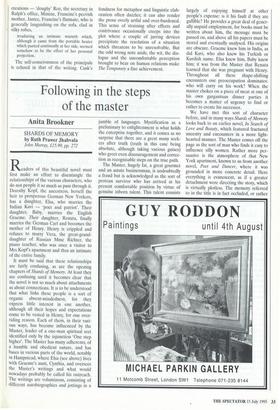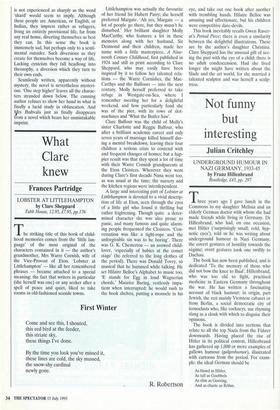Following in the steps of the master
Anita Brookner
SHARDS OF MEMORY by Ruth Prawer Jhabvala John Murray, £15.99, pp. 272 Readers of this beautiful novel must first make an effort to disentangle the relationships of the various characters, who do not people it so much as pass through it. Dorothy Kopf, the ancestress, herself the heir to prosperous German New Yorkers, has a daughter, Elsa, who marries the Indian Kavi — 'poet and patriot'. Their daughter, Baby, marries the English Graeme. Their daughter, Renata, finally marries the German Carl and becomes the mother of Henry. Henry is crippled and refuses to marry Vera, the great-grand- daughter of Russian Mme Richter, the piano teacher, who was once a visitor to Mrs Kopf s apartment and thus an intimate of the entire family.
It must be said that these relationships are fairly confusing, as are the opening chapters of Shards of Memory. At least they are confusing until it becomes clear that the novel is not so much about attachments as about connections. It is to be understood that what links these people is a sort of organic absent-mindedness, for they express little interest in one another, although all their hopes and expectations come to be vested in Henry, for one over- riding reason. Each of them, in their vari- ous ways, has become influenced by the Master, leader of a one-man spiritual sect identified only by the injunction 'One step higher'. The Master has many adherents, of a humble and obedient nature, and has bases in various parts of the world, notably in Hampstead, where Elsa (see above) lives with Graeme's aunt, Cynthia, and oversees the Master's writings and what would nowadays probably be called his outreach. The writings are voluminous, consisting of different autobiographies and jottings in a jumble of languages. Mystification as a preliminary to enlightenment is what holds the enterprise together, and it comes as no surprise that there are a great many seek- ers after truth (truth in this case being absolute, although taking various guises) who greet even discouragement and correc- tion as recognisable steps on the true path.
The Master, hugely fat, a great gourmet and an astute businessman, is undoubtedly a fraud but is acknowledged as the sort of protean survivor who has arrived at his present comfortable position by virtue of genuine inborn talent. This talent consists largely of enjoying himself at other people's expense: is it his fault if they are gullible? He provides a great deal of gener- ally unpaid employment, for books must be written about him, the message must be passed on, and above all his papers must be stored and eventually analysed. His origins are obscure. Graeme knew him in India, as did Kavi, who also knew his Turkish or Kurdish name. Elsa knew him, Baby knew him; it was from the Master that Renata learned that she was pregnant with Henry. Throughout all these shape-shifting encounters one preoccupation dominates: who will carry on his work? When the master chokes on a piece of meat at one of his own gargantuan dinner parties it becomes a matter of urgency to find or rather to create his successor.
We have met this sort of character before, and in many ways Shards of Memo?), looks back to an earlier novel, In Search of Love and Beauty, which featured fractured ancestry and encounters in a more light- hearted manner. The Master comes off the page as the sort of man who finds it easy to influence silly women. Rather more per- suasive is the atmosphere of that New York apartment, known to us from another novel, Poet and Dancer, where it was grounded in more concrete detail. Here everything is evanescent, as if a greater detachment were directing the story, which is virtually plotless. The memory referred to in the title is in fact occluded, or rather is not experienced as sharply as the word 'shard' would seem to imply. Although these people are American, or English, or Indian, they impress rather. as refugees, living an entirely provisional life, far from any real home, diverting themselves as best they can. In this sense the book is immensely sad, but perhaps only to a senti- mental outsider. Such diversions as they create for themselves become a way of life. Lacking cynicism they fall headlong into theosophy, a diversion which they turn to their own ends.
Seamlessly written, apparently without mystery, the novel is nevertheless mysteri- ous. 'One step higher' leaves all the charac- ters stranded down below. The cunning author refuses to show her hand in what is finally a lucid study in obfuscation. And Isirs Jhabvala just as finally disappears from a novel which bears her unmistakable imprint.



















































 Previous page
Previous page